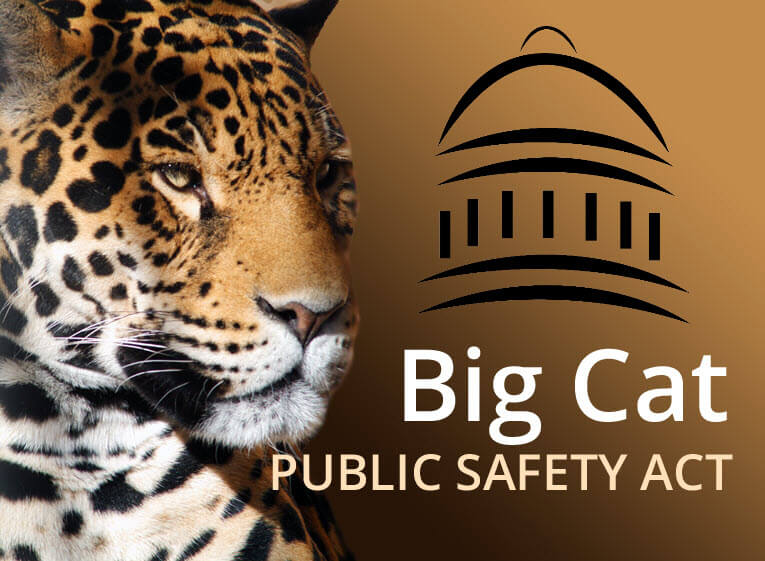There are thousands of privately owned big cats (lions, tigers, cougars, leopards, cheetahs and jaguars) around the country. Many of these cats live in extremely degraded and inhumane conditions. For more than a decade various U.S. wild cat conservation organizations have been working to stop big cat private ownership and abuse. The Big Cat Public Safety Act was Introduced in 2019 to put an end to the ownership of big cats as pets and to stop cub petting and photo op exploitation.
The Big Cat Public Safety Act H.R. 1380 – 116th Congress (2019-2020)
H.R. 1380 was a U.S. bill to regulate the private ownership of big cats such as lions, cheetahs, leopards, cougars, jaguars, tigers and other prohibited wildlife species. It had a very narrow focus on privately owned animals, with exemptions for zoos that meet specific standards of care, animal sanctuaries and universities.
The bill was initially introduced during the 115th Congress (2017-2018) to prevent the breeding or possessing of big cats and other prohibited wildlife species. It was re-introduced to the U.S. House of Representatives (H.R. 1380) on February 25, 2019 by U.S. Representatives Mike Quigley and Brian Fitzpatrick.
““From irresponsible breeding to inhumane living conditions and public exploitation, the mistreatment of big cats comes in a variety of forms,” said Representative Quigley in a February 26, 2019 press release. “By introducing the Big Cat Public Safety Act, we are working to address a serious issue that causes immeasurable animal suffering and introduces inexcusable threats to human safety. State laws regarding private ownership of big cats are inconsistent or nonexistent, which is why a uniform federal law is necessary to end this dangerous industry once and for all.”
A legislative hearing was held on March 26, 2019 by the House’s Natural Resources subcommittee on Water, Oceans, and Wildlife. Here you can watch the testimony given during the Water, Oceans and Wildlife hearing. The testimony starts at 57.00 minutes and is given by Ms. Barylak, International Fund for Animal Welfare
Some key aspects of the bill:
-
-
-
- Existing owners could keep their pets but, once the bill was passed, big cats could no longer be privately owned.
- It ended the practice of allowing the public to pet cubs and take photos.
- Fines and Penalties. Anyone who violated the law would face up to $20,000 in fines and up to 5 years in prison.
Click here to download Big Cat Public Safety Act H.R. 1380
-
-
-
-
The Big Cat Public Safety Act H.R. 263 – 117th Congress (2020-2021)
Introduced in the U.S. House or Representatives on January 11, 2021 by Representative Mike Quigley, this bill revises requirements governing the trade of big cats (lion, tiger, leopard, cheetah, jaguar, or cougar or any hybrid of such species). Specifically, it revises restrictions on the possession and exhibition of big cats, including to restrict direct contact between the public and big cats. It amends the Lacey Act of 1981. -
The bill was referred to the Subcommittee on Water, Oceans and Wildlife on February 18, 1921. It has 242 co-sponsors.
-
Click here to download Big Cat Public Safety Act H.R. 263
-
-


Not all facilities are poorly operated. Panther Ridge is a smaller facility that takes in cats that no where else to go. It was top rated by Insider.com in Florida. Poorly run or e positive operations should forced to higher standards or then possibly closed.